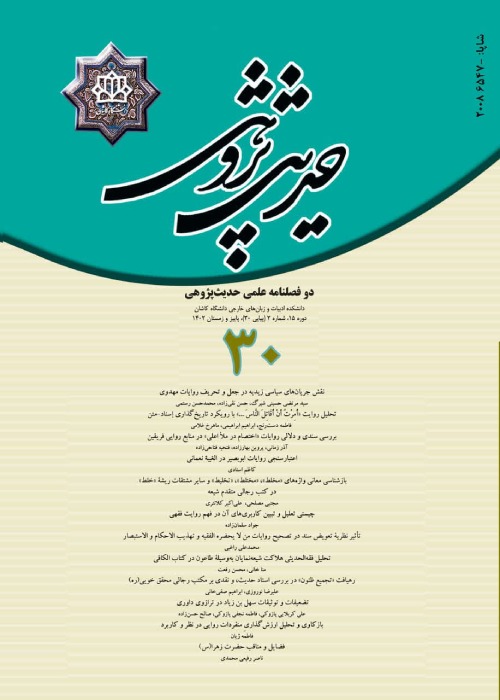Isnad and implicational Review of “ikhiṣām dar mala' a'ā'” in Sunni and Shia tradition Sources
The story of Adam is a well-established story among followers of divine religions, which begins with the creation of Adam from clay, continues with his residence in the Paradise and ends with his and wife’s descent down to Earth, resulting in his bereavement from the world of heavens and marking the beginning of his life on the earth. This story has been narrated in seven surahs in the Qur’an8. While each interpretive approach provides its own special reading of Adam’s story, a review of Hadith-based research about the story reveals that a handful of narratives have been validated from evidential and argumentative points of view. A part of these narratives has only been validated from a specific evidential and textual point of view, while no such criticisms are provided of other narratives. Q.38:69 “I had no knowledge of the Highest Chiefs when they disputed (matters among themselves)” is one of the verses that engenders interpretive differences. This verse discusses an event in Mala’ A’la or a gathering of the highest and the most exalted angels, followedby a dialogue between God and the Satan (the Iblis), and the latter’s disobedience of prostrating Adam.
Methods and Materials:
This study fell under descriptive-analytical methods and aimed to explain the concept of ikhtiṣām and elaborate on manners and qualities of verses related to the debate in the surah. Then, the study goes on to demonstrate interpretive documents and narratives on the verse as based on sources provided by Sunni and Shia sources. The study also sought to explore the reason behind the ikhtiṣām and identify people or groups on both sides of the ikhtiṣām .This study used twenty-six narrative interpretations, 13 of which pertain to Shiite and 12 to Sunnite sources9. Another exegesis was provided by a Zeidi author10. The Qomi exegesis11and the Mosnad by Ibn Hanbal are among the oldest sources of the Sunni and Shia sources, which pertain to the narrative of the ikhtiṣām among mala' a'la. First, the text of the narrative provided by the Qomi exegesis was fully read and was then followed by other similar narratives. Relevant hadiths with the same themes were considered, also. In addition to the narratives of ikhtiṣām case, the hadiths under the category of darajāt and kaffarāt were also examined.
Results and Finings:
Despite the well-established manner noted in verses of Surah Saad, the interpretive narratives of Sunni and Shia sources about ikhtiṣām among mala' a'la do not imply what has been referred to in the Story of Adam; rather, this ikhtiṣām has been attributed to other affairs as in darajāt and kaffarāt (narrative sources by Shia and Sunnis) and “the designation of a successor to the prophet” (Shiite narrative sources). The manner of verses of this surah is suggestive of four dialogues. A summary of these verses reveals that “You were unaware of what ensued a contention arising from immense news in the Heavens; as a result, you went astray and shall demand the punishment of those who misled you”.There seems to be a meaningful relationship between the so-called ikhtiṣām and Adam creation, following the mentioning of the story of Adam and Satan’s turning away from prostrating him, (Verses 71-85).A review of evidence suggested the evidential weakness of Qomi exegesis narrative. Qomi considers ikhtiṣām as concerning darajāt and kaffarāt and fails to provide a commentary on that. Narratives about what the prophet said about this surah and the ikhtiṣām and what kinds of questions Muslim asked are lacking.Following Barghi’s Mahasin, the oldest book concerned with darajāt and kaffarāt (without links to the narrative of ikhtiṣām among mala' a'la) is Sheikh Sadouq’s Man lā Yaḥḍuruhu al-Faqīh12. The narrative shows that explaining darajāt and kaffarāt is part of the prophet’s advice and recommendations to the Commander of the Faithful (Imam Ali). Sunni sources have also quoted narratives about darajāt and kaffarāt in different ways, though with minor differences. darajāt and kaffarāt are also noted under the category of the prophet’s advice to the commander of the faithful, as the oldest source about the said advice is attributed to Beihaghi’s narrative (1065), cited in Dalail un Nubuwwah13. Had the narrative of ikhtiṣām among mala' a'la been only quoted from the prophet (peace be upon him), it could have been transferred to Shia sources, also; however, Shia sources have cited this narrative through the infallible Imams, which is indicative of the narrative validity.
The validity and truthfulness of the texts could not be demonstrated; however, the date at which the surah was sent down, the manner of the last verses of the surah of Saad and the total of narratives with similar keywords reinforce the hypothesis that the narratives of the ikhtiṣām among mala' a'la refer to the contention between the opponents and the caliph designated by God. Meanwhile, by way of distortion, this contention was attributed to darajāt and kaffarāt; hence, the key theme of the ikhtiṣām narratives is understood as opposition to the caliph designated by God, the example of which on one day being Adam and, on another day, the infallible Imams.
- حق عضویت دریافتی صرف حمایت از نشریات عضو و نگهداری، تکمیل و توسعه مگیران میشود.
- پرداخت حق اشتراک و دانلود مقالات اجازه بازنشر آن در سایر رسانههای چاپی و دیجیتال را به کاربر نمیدهد.




